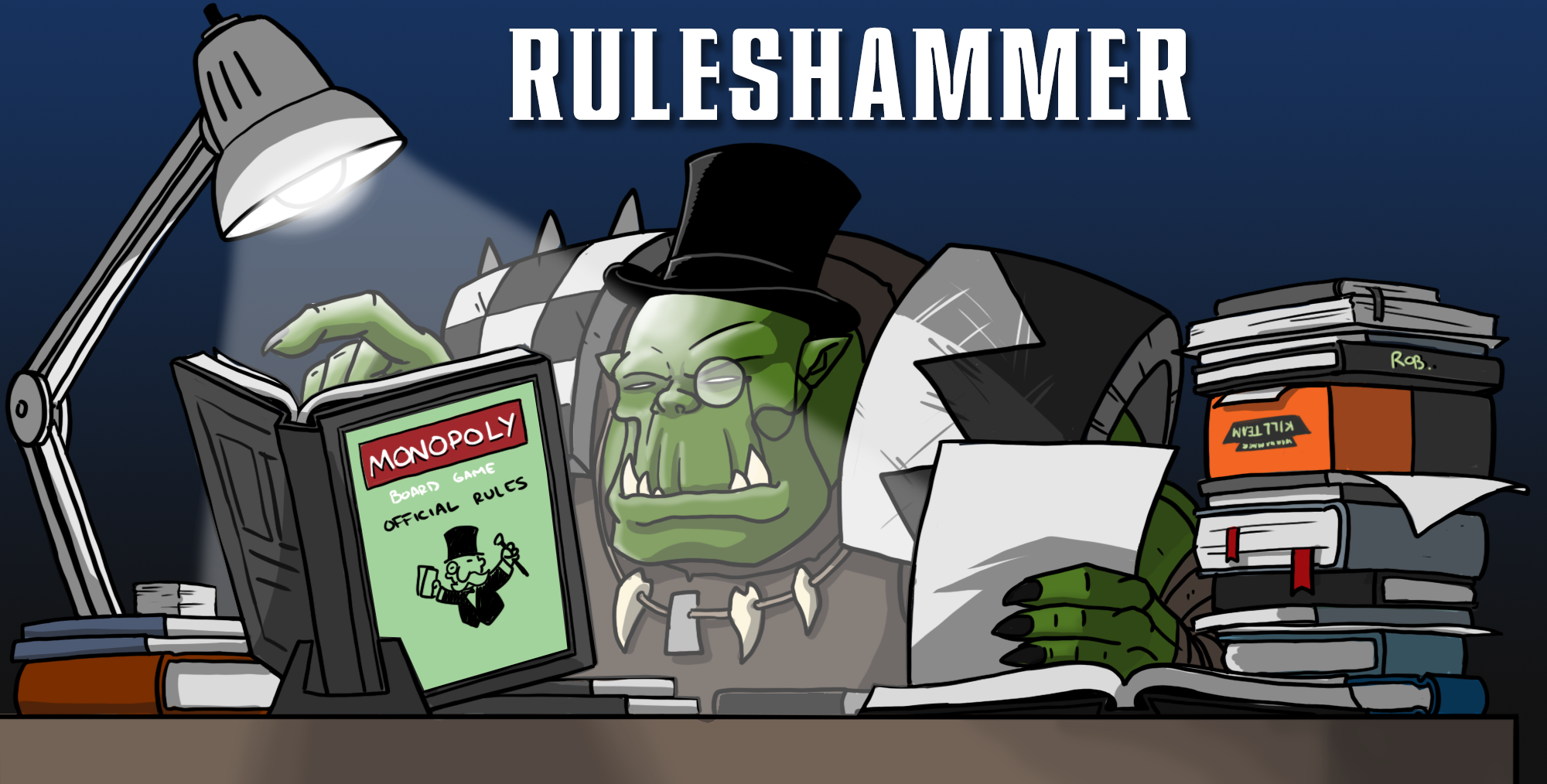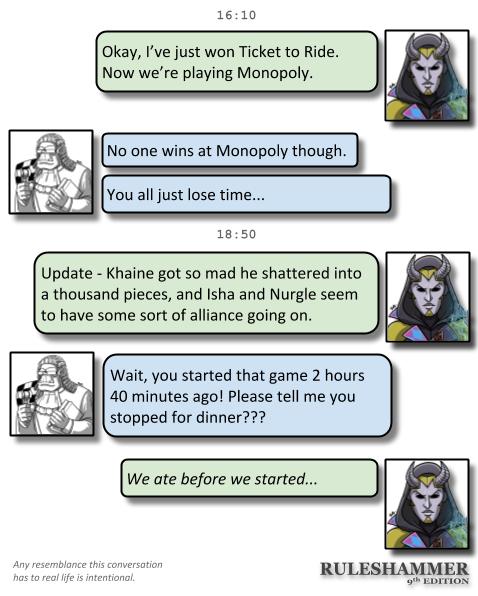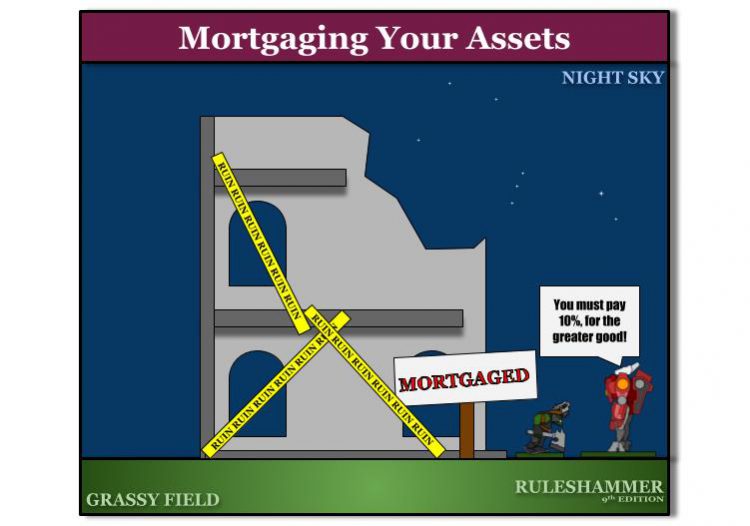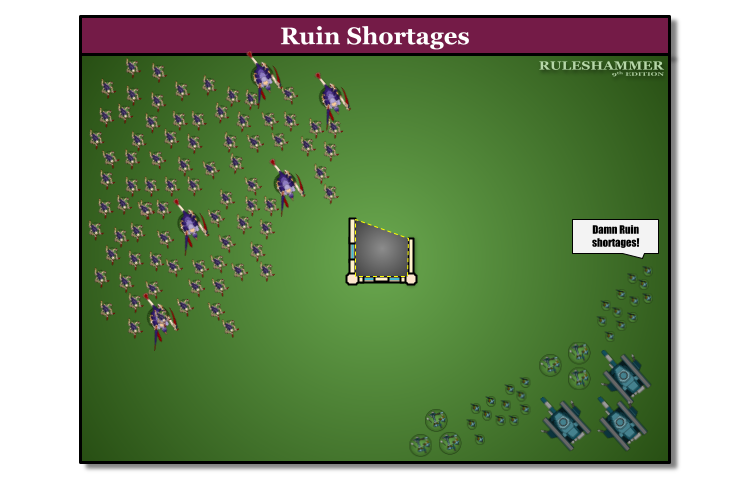It’s a festive time of year for many right now, and nothing helps to build happy family memories like a good board game! As a kid I loved Monopoly – I even have a small collection of variants of the game as I would get a new one for Christmas each year. Pokemon, Simpsons, Star Wars Episode 1… you get the idea. Here’s the thing though: Monopoly is a bad board game. Very bad. There’s many many reasons for this, such as the fact that it was designed ON PURPOSE to make people miserable as an allegory for the dangers of capitalism. In my personal experience one of the key problems is how long the game takes to play, though would you believe me if I told you that if you actually play by the rules in the box the game should only take about an hour and a half? That many of the rules your family cling to aren’t even in the book and actually make this hellish experience longer? What if I told you there was actually a board game with Monopoly in the title that was GOOD? Read on for all this and more!
Rob “TheChirurgeon” Jones’s Editor Note: Despite Rob “Vre’kais” Chilton’s insistence that Monopoly can, with the right adjustments, not be a completely awful time, it is not, in fact, a good board game and here at Goonhammer we do not recommend that you play it. There are plenty of easier ways to learn about the soul-crushing dangers of capitalism, such as just being alive in the 21st century. That said, it can be pretty fun to get in bidding wars that screw your friends over by forcing them to overpay for Baltic Avenue and if you find yourself stuck having to play Monopoly with family this holiday season, you may as well play the best possible version of the game, and become That Guy Who Forces His Family to Abide By the Rules of Monopoly.
GREGNOTE: Buddy if you want a lesson on the dangers of capitalism that takes less than an evening to play out, may I recommend a little television program you may have heard of, called THE NEWS? Blammo, mindfreaked.
Rob: Also Greg and I are tagging along on this one to talk about Monopoly because it’s Wednesday night and we felt like abusing our editor powers. Sorry, Rules Rob.
Establishing a metric for “A Good Board Game” that will make Monopoly seem alright
Okay so other than the whole “this is miserable” thing I’d like to establish some sort of framework for how I personally judge board games (or games in general) when determining whether they’re worth my time. As you might have guessed from my weekly columns on the intricacies of the rules of Warhammer 40k, I’m a really fun person, so I like to apply some basic arithmetic to determine which games I like to play. Specifically, the most important test for me is this:
The closer [TIME TO DETERMINE WINNER] is to [TIME SPENT PLAYING GAME] the better the game is.
That is, the longer the outcome of the game is in doubt, the better the game is likely to be. Games where a winner is determined early and half the play time is a foregone conclusion, or games where players in losing positions can rarely, if ever, catch up are bad.
For Monopoly though there’s also another important factor to consider, which is [TIME I WANT TO PLAY GAME FOR]. If we factor that in, the full metric becomes:
While [TIME SPENT PLAYING GAME] is less than [TIME I WANT TO PLAY GAME FOR], the game is better the closer [TIME TO DETERMINE WINNER] is to [TIME SPENT PLAYING GAME].
One of the biggest issues with Monopoly is that so often you know who has won LONG before the end of the game. Sometimes hours. Just like with real capitalism, one player accumulates an insurmountable lead and then can leverage their vast wealth to slowly squeeze the life out of everyone else, making the back half or two thirds of the game a grim slog toward inexorable defeat. Fun times! But as I mentioned above it doesn’t have to be that way, and there are a lot of things players do that create this problem and make it much worse.
The Rules that people ignore make the game longer
Almost every rule in Monopoly is designed to move or remove money. Not all of them – passing Go is the obvious money creator – but there are some Chance and Community Chest cards that add money (though there’s plenty that remove it as well). Some rules or mechanics are 100% about making the game take less time, though. Throughout this I’m going to be referring to The Official Rules for Monopoly from Hasbro, so refer to the link if you haven’t read them.
Let’s start by exploring some common rules that people playing Monopoly often ignore, and for which doing so makes the game take much longer (and makes it worse).
Auctions
If you do not wish to buy the property, the Banker sells it at auction to the highest bidder. The buyer pays the Bank the amount of the bid in cash and receives the Title Deed card for that property. Any player, including the one who declined the option to buy it at the printed price, may bid. Bidding may start at any price.
Probably one of the rules we used the least as children, I realise now that this rule is trying to do one thing: get all the property sold as quickly as possible. The longer there are still free places for you to land on, the longer the game will take. I’m not sure why people ignore this rule; I think we might have not thought it fair that landing on somewhere we couldn’t afford meant other players could buy it instead. Well Monopoly isn’t fair! This game is about forming strong adversarial relationships with your loved ones that you can rely on for years to come, so let’s start the bidding at $600.
Rob: This rule was a big deal among my crew in high school when we’d play, and could be a real friendship-ender. Your goal here isn’t so much to buy a property at auction (unless you reaaaally need it cause it’s like a railroad), but to punish the complete shit out of someone for attempting to buy it. This leads to dangerous games of chicken where you are trying to bid up a property you don’t really want in order to bankrupt someone else who needs it.
GREGNOTE: We stopped playing Monopoly as a family unit when it became obvious to my dad that he could cause more fights with Risk, but we never used this rule. In fact I’m probably in the majority of players that didn’t know it was there at all, because I also windmill slammed the buy button on any piece of trash property I’d land on.
Something else Rob brought up, that I find deeply hilarious, is that even in the 1930s hellworld this game lives in, where rapacious robber-barons extract rent like a dentist pulling teeth, they still had trains. They made a board game about how bad everything sucks, and it still wasn’t as bad as what we actually got. That rocks.
Mortgage Fees
In order to lift the mortgage, the owner must pay the Bank the amount of the mortgage plus 10% interest. When all the properties of a color-group are no longer mortgaged, the owner may begin to buy back houses at full price. The player who mortgages property retains possession of it and no other player may secure it by lifting the mortgage from the Bank. However, the owner may sell this mortgaged property to another player at any agreed price. If you are the new owner, you may lift the mortgage at once if you wish by paying off the mortgage plus 10% interest to the Bank. If the mortgage is not lifted at once, you must pay the Bank 10% interest when you buy the property and if you lift the mortgage later you must pay the Bank an additional 10% interest as well as the amount of the mortgage.
Okay I know why we ignored this one… I was 8 and my sisters were younger than that. What the heck is 10%? WHAT IS %???? Yeah I don’t blame my parents for deciding to just avoid teaching us percentages. They could have probably explained it to us given enough time but at that point the maths are complicated beyond what you might expect for a lot of younger children. Factor in most peoples’ aversion to math and you’ve got a recipe for a rule that is likely to be ignored by the bulk of your player base.
The problem is that this rule adds a much needed cost to mortgaging your properties. If you think about it, mortgaging a property doesn’t actually add any money to the game. You get some of the money you (or another player) gave to the bank back, but you’re still going to realize a net loss. Even for players who are following the rules, I’ve noticed that it’s not uncommon for them to not realise that that you have to pay the 10% back when trading a mortgaged property AND if you don’t unmortgage it right away you have to pay it again later on. This makes buying mortgaged properties significantly more expensive.
GREGNOTE: This rule is horrendous. You think I don’t got enough problems in life, that I need to be doing sliding price-cost calculations on interest fees for a board game about being a bum? Just play TurboTax if you need to scratch that particular itch, dork, and get out of my face with this.
Rob: As someone with a degree in Mathematics, this rule is good, actually
Collecting Rent While In Jail
Even though you are in Jail, you may buy and sell property, buy and sell houses and hotels and collect rents.
I sort of understand why people might think this isn’t allowed, commonly depictions of jail or prison don’t really talk about this. I think if you really get into the Role Playing aspect of monopoly though, it starts to make more sense. You are a landlord, you own PROPERTY… What does that say about the character you are portraying? They are rich! Rich people don’t have to give up their homes and assets when they go to jail, especially if they are rich enough that those assets make enough money on their own that you don’t need to be working day to day to pay bills or things. Just another brilliant way that this game subtly reminds you that this game isn’t about becoming rich, it’s about becoming richer whilst everyone around you goes bankrupt!
Rob: This is, by the way, why the safest place to be in late-game Monopoly is in jail. Enjoy your time in white-collar resort prison collecting that sweet, sweet rent while the rest of those chumpass losers are forced to spend hundreds of dollars staying at the fancy hotels on your property. Meanwhile you’re living it up in the big house while the reporters who fell in love with you during your big trial for securities fraud defend your actions on Twitter and you’re just kicking back listening to the Wu-Tang album only you are allowed to listen to. Hell yeah, capitalism rules.
GREGNOTE: Given that the stated goal of Monopoly is to begin the jokerfication process of the youth, I object strongly to the house-rule fantasy of “slumlords not profiting while imprisoned”, but even if you play this correctly, I still have problems with the idea that they’d go to jail in the first place. Undermines the whole concept. In fact, there should be a house rule that as soon as you own at least three homes, you can drive drunk all across the board if you want, and never go to jail for it.
Housing Shortages
But you must build evenly, i.e., you cannot erect more than one house on any one property of any color-group until you have built one house on every property of that group. You may then begin on the second row of houses, and so on, up to a limit of four houses to a property. For example, you cannot build three houses on one property if you have only one house on another property of that group.
As you build evenly, you must also break down evenly if you sell houses back to the Bank (see SELLING PROPERTY).
HOTELS: When a player has four houses on each property of a complete color-group, he/she may buy a hotel from the Bank and erect it on any property of the color-group.
Okay so first of all you have to build evenly, you can’t just put 4 houses on a single property in a group with the other two empty. Not only that though but the rules require a property to have 4 houses on it before you can build a hotel. If you have 3 properties in a set with 3 houses each on them, and only 2 houses left in the bank, then you can’t build Hotels. All of the properties need to be at 4 houses before you build the hotel because of the even build rule.
This leads to housing shortages which are absolutely intended to be a feature of the game, and you might encounter the odd player who intentionally aims to create them because preventing other players from building is almost as good for them as collecting rent on their own property.
Rob: Yeah so this right here is the rule of the game. The pro-est, most dickhead move in all of Monopoly is to sell your hotels back to the bank (albeit at half-price) in exchange for four houses on each property in order to run out the amount of houses in the game and prevent people from buying new houses. Then when you have an opportunity to develop more houses, swap those out for hotels and get to building new houses. Watch out for the clever jerks who try to sneak in their own extra houses from their copy of Monopoly, though.
GREGNOTE: The only time you should be building Hotels anyway is to put them on Baltic and Mediterranean, because that is the definition of becoming King Shit On Trash Mountain. That said, normally if you want to induce a housing shortage you have to bribe a zoning committee or start fracking, but those are, regrettably, not systems Monopoly includes, so hoarding all the goddamned lumber in town is a fine mechanic to get you there.
No Buying Before First Lap of the board
It seems this rule has actually been dropped from current editions of the board game, I’m not sure exactly when but it might coincide with the addition of Speed Dice rules. This rule isn’t 100% necessary but it does do one thing, it uses one lap of the board to randomise the starting positions of the players. Otherwise turn 1 the first player has a really good chance they’ll buy one of the light blues, and there’s a really low chance that anyone will land on and buy one of the brown properties.
GREGNOTE: Another game with notable first-turn advantage. The latest-edition Monopoly meta is really suffering due to this change.
You Have to Ask for Rent
The owner may not collect the rent if he/she fails to ask for it before the second player following throws the dice.
Perhaps the most ignored or even unknown rule of monopoly, is that you have to ask for rent. I’ve never been 100% sure on the wording of this though and honestly it’s perhaps the only rule in the book I would actually suggest players ignore, and instead just always pay. The confusion I have about it though is if “second player following” is “the next player after the first one that just landed on you” or if you had players A, B, C and D and B landed on you, then you have until D has rolled to ask.
Rob: I read this as “you have the following player’s entire full turn to ask for rent and if you forget by the time the player after them throws the dice, welp looks like you’re waiting for next month’s rent from some other jerk.” The beauty of this rule is that it gives you an excuse to say “you got my money? You better have my damn money. Where is my money?” every time someone lands on your property, so I recommend you go with this rule.
GREGNOTE: I’m torn on this one. On the one hand, I feel like you can just yell at them regardless, and nothing is more annoying than a shouted “give me your lunch money, nerd” when the person is already counting out your money, and also making this a rule means that it’s not cheating if you try to skate on rent, which makes non-payment not a crime, thus less cool. On the other hand, it’s pretty funny to watch someone play themselves by handing you rent you didn’t even ask for, and that they could have just not given you if they hadn’t insisted on being honest and/or a dumbass. In conclusion, who cares.
Common Monopoly House Rules that are just awful
Free Parking Collects Fines
This is probably the most popular house rule that I’m aware of, essentially you put all the money that the game is trying to remove via fines and fees (but not property purchases) and place them in the middle of the board. Then the next player to land on Free Parking (not pass just pass over it) collects this money.
This can drastically change the fortunes of a player, or it can absolutely solidify one player’s lead over the others. One thing it almost always does though is ensure that the game takes longer because Monopoly only ends when all but one player is bankrupt, so any mechanic that slows down that process extends the game. And Monopoly needs all the help it can get speeding things up.
Rob: This rule is for cowards and the weak. I do not respect anyone playing with this rule, and the players who land on Free Parking and luck into their fortunes are the Monopoly equivalent of New Money. They land on that space and next thing you know they’re blowing their money on gaudy purchases and destroying the property values you worked hard to inflate.
GREGNOTE: Huh. Legit did not know this wasn’t the rules. I think they should replace Free Parking with the kind of windfall that all money really wants, which is that landing on this space should let you run over another player with your car, removing them from the game entirely and handing their real estate empire off to either a designated Failson/Faildaughter, or to the bank to be auctioned off.
Houses Sell For Purchase Prices
I’m not sure how common this one is, my parents may well have made it up because otherwise me and my sisters apparently refused to buy houses. Losing half their value if we had to sell them just always seemed too risky to me when I was 10 to 12 years old, so instead we were taught to see them as money we had on the board we could get back if we needed to.
So yeah not exactly a sound financial lesson although oddly enough; adult me resisted buying a house for as long as possible so maybe I did learn something back then? The “half what you paid” rule for houses is 100% there to make buying them a risk you weigh up each time you build.
Rob: Don’t let this deter you from selling your hotel to force a housing shortage, though.
GREGNOTE: Imagine houses losing value. Imagine not socking away generational wealth in homes instead of doing something useful with it.
Landing on Go for $400
This one is common enough to be present in a few of the electronic versions of Monopoly, and it’s keeping to the general theme of house rules that basically say “let’s add more money to the game”, it’s perhaps a little less varied than the “Free Parking collects fines” rule but it’ll still add significantly more time to the game.
Rob: This rule is just bad.
GREGNOTE: Trash rule. Immediately quit the game and stop being friends with the person who tries this. Sorry not sorry if this means you can’t talk to your mom anymore, but them’s the breaks.
When you put all of these rules together, you end up with a Monopoly that’s much more aggressive about taking money away from players, creates more cutthroat stakes, and essentially pushes players out of the game much faster, leading to a shorter, if not more enjoyable, experience. It’s a much better way to play Monopoly overall, though if you want to play an actually fun variant of Monopoly, I’ve got an even better suggestion…
The better Monopoly Game that changes almost everything for the better: Monopoly City
Okay so I think I’ve laid out a fairly strong case for why if you must play normal Monopoly this year, that sticking to the actual rules in the game will reduce the game length considerably. If you were to go out and actually buy a Monopoly game today though, is there one that is actually good? In my opinion the answer to that is: Yes. and that version is called Monopoly City.
The Official Monopoly City Rules from Hasbro
How is Monopoly City different and why is it better?
Monopoly City re-envisions the board as a more interconnected city, with zoning and quality of life considerations. A few things set Monopoly City apart from its tired predecessor:
- You don’t need to own every property in a colour group before you can start building on it. This means that from the very first turn, every player will usually get to interact with more parts of the game.
- City introduces a different layer of choice when it comes to building: Residential or Industrial blocks. The rent you collected is based on the total number of blocks on a property (of either type) however residential blocks count for nothing if a hazard is built on that property by another player (certain effects allow you to build these on other players’ properties). Industrial blocks cost twice as much as residential though. GREGNOTE: This is exactly the point where I stopped reading, because it’s turning into some German Board Game shit, which is 100% extremely not my type of thing. Have fun with Monopolies of Catan I guess, I’m out.
- Hazards are the “Not In My Backyard” type of things such as Rubbish Tips, Sewage Treatment plants, Prisons, and Power Stations. You can pay to have these removed, or block them being built by building a bonus building on your property first (these are things like Schools or Parks). There are several “Planning Permission” squares on the board, landing on them allows you to place a Bonus or Hazard.
- Mortgages are based on the property’s current rent value, and you can’t actually sell residential or industrial blocks at all. I prefer this because it makes trades for a set easier in a game that lets you build from the start, and the money invested in improving a property remains entirely in the bank, rather than half of it coming back out later.
- You are limited randomly on how many blocks you can build max per turn. This levels out the development speed of the game and prevents one player from quickly taking the lead with large building investments.
- The game’s suggested win condition is richest after 1 hour, rather than when all players are bankrupt. The way the game fundamentally changes Monopoly’s core concepts means that generally there are less runaway richest players in this version and it can make for games that are quite close, with pressure to play faster as time winds down. One alternate win condition I’ve used (though not an official one) is racing to be the first to construct the Monopoly tower.
It’s also a really nice set with some really detailed plastic game pieces for all the hazards, bonuses and blocks. The idea being that in the centre of the game board, a space usually only occupied by some chance and community chest cards, actually becomes a bustling metropolis over the course of a game.
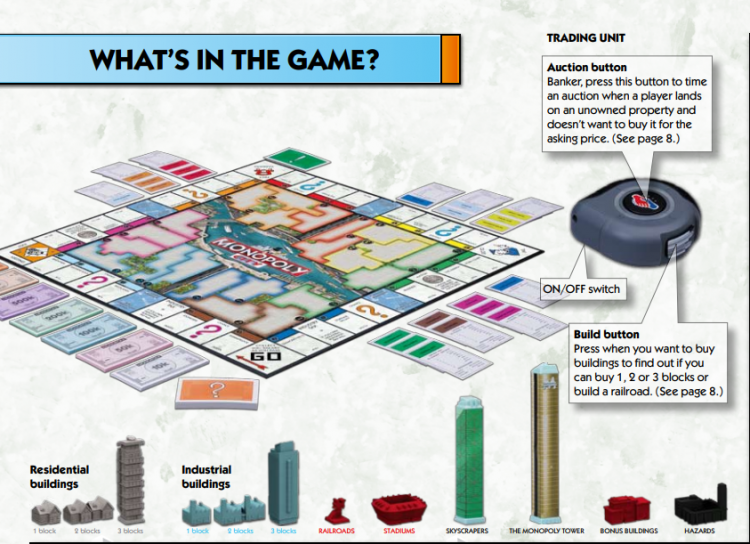
It’s still Monopoly at its core though, so you are still the villains of the story and the aim of the game is to be the meanest Scrooge at the table. Still, Monopoly City makes for a much more fun experience for everyone, especially if judged by my “good game” metric. So prep your top hats, shine your monocles, and get ready to kick Tiny Tim’s crutches out from under him as you claw your way to the top of the capitalism pile.
GREGNOTE: I legitimately thought this was a fake version of the game that you made up specifically to fuck with me, as a funny Bit, but this is real. Why? And also, no.
Rob: I am kinda digging it, because the notion of building a sewage treatment plant right in the middle of a neighborhood someone else has been developing is absolutely hilarious to me. Also the idea that the only reason you’d even build schools in your high-priced residential areas filled with high rises is to prevent someone from putting a prison on your property is American as hell.
Ruleshammer’s Official List of Recommended Better Games
Here are some other games we enjoy, ranked:
- Pandemic
- Ticket To Ride
- Concept
- Codenames
- Suspicion – Still as far as I can tell USA only
- Forbidden Island (also Forbidden Desert and Forbidden Sky)
- Fluxx
- A nice cup of your favorite hot beverage
- Spitting into each other’s mouth
- Monopoly
- Monopoly City
You can also check out Boardhammer’s Gift Guide for more!
We’ll be back to our normal Ruleshammer next week so if have you any questions or feedback or have a rules question you want answered, you can drop us a note in the comments below, ask a question in our Ruleshammer form, or head over to r/ruleshammer to discuss. Until then, have a happy holiday!
